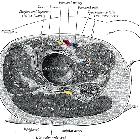Musculus iliacus


The iliacus muscle is one of the muscles of the posterior abdominal wall and contributes to the iliopsoas muscle and tendon.
Summary
- origin: superior 2/3s of the iliac fossa, anterior sacroiliac ligaments and anterior sacral ala
- insertion: into the psoas major tendon to form iliopsoas tendon which inserts on the lesser trochanter of the femur
- innervation: femoral nerve
- action: stabilizer and flexor of the hip
Gross anatomy
The iliacus is a large muscle that fans out over the iliac fossa and converges inferiorly to form a tendon which merges with that of the psoas major muscle, forming the iliopsoas muscle. The tendon descends, passing deep to the lateral aspect of the inguinal ligament, to insert on the lesser trochanter of the femur.
The muscle lies in the concavity of the iliac fossa, lateral to the psoas major muscle. There are several nerves of the lumbar plexus that pass over the anterior surface of the muscle, including (from lateral to medial):
Deep to the muscle in the inferior 1/3 of the iliac fossa where there is no muscular attachment lies the iliac bursa which may or may not communicate with the hip joint.
Siehe auch:
und weiter:

 Assoziationen und Differentialdiagnosen zu Musculus iliacus:
Assoziationen und Differentialdiagnosen zu Musculus iliacus: